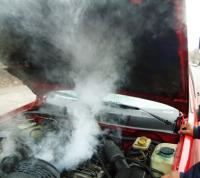
When it comes to selecting the perfect radiator replacement for your vehicle, several key factors should influence your decision-making process. Firstly, consider the compatibility of the replacement radiator with your vehicle’s make and model. Ensuring the proper fit is essential for optimal performance and longevity. Next, evaluate the material and construction quality of the radiator. Opting for a durable and corrosion-resistant material such as aluminum can significantly extend the lifespan of the replacement radiator. Additionally, take into account the cooling capacity and efficiency of the radiator to ensure it can effectively regulate your engine’s temperature, especially under demanding driving conditions. Cost is another crucial consideration, but it’s essential to strike a balance between affordability and quality. Lastly, consult with knowledgeable professionals or refer to trusted reviews to gain insights into the reputation and reliability of different radiator brands and manufacturers. By carefully weighing these factors, you can confidently select the right radiator replacement that meets your vehicle’s needs and your budgetary constraints.
Understanding Your Vehicle’s Cooling System: Exploring the Basics
Your vehicle’s cooling system is crucial for maintaining optimal engine temperature and preventing overheating. It consists of various components, with the radiator playing a central role. The radiator works by dissipating heat generated by the engine through coolant circulation. Understanding this system involves familiarizing yourself with the radiator’s function, as well as other parts like the water pump, thermostat, and hoses. Knowing how these components work together helps you grasp the importance of choosing the right radiator replacement to ensure efficient cooling and engine performance.
Assessing Your Radiator Needs: Factors to Consider
Several factors come into play when assessing your radiator needs. Firstly, consider the make and model of your vehicle, as radiators are often designed to fit specific models or engine types. Next, evaluate your driving habits and environmental conditions. If you frequently drive in hot climates or tow heavy loads, you may need a radiator with enhanced cooling capacity. Additionally, assess your budget and desired lifespan for the replacement radiator. By considering these factors, you can narrow down options and choose a radiator that meets your specific needs.
Compatibility Matters: Ensuring the Right Fit for Your Vehicle
One of the most critical aspects of selecting a radiator replacement is ensuring compatibility with your vehicle. Radiators come in various sizes, shapes, and configurations, so it’s essential to choose one that fits seamlessly into your vehicle’s cooling system. This involves matching the radiator’s dimensions and connection points with those of your vehicle, as well as verifying compatibility with the engine and transmission. Installing a radiator that isn’t compatible can lead to leaks, inefficient cooling, and potential damage to other components. Therefore, carefully checking compatibility ensures optimal performance and prevents costly repairs down the line.
Quality vs. Cost: Striking the Balance for Long-Term Performance
When choosing a radiator replacement, it’s tempting to opt for the most affordable option. However, prioritizing cost over quality can have long-term consequences. While budget-friendly radiators may save you money initially, they may lack durability and performance, leading to frequent replacements and potential engine damage. On the other hand, investing in a higher-quality radiator may require a larger upfront investment but can offer better cooling efficiency, corrosion resistance, and longevity. By striking a balance between cost and quality, you can ensure reliable performance and avoid future headaches and expenses associated with inferior products.
Exploring Different Radiator Types: Pros and Cons
Radiators come in various types, each with its own set of advantages and disadvantages. Traditional copper and brass radiators are known for their excellent heat transfer properties and durability but tend to be heavier and more expensive. Aluminum radiators are lighter, more affordable, and offer good heat dissipation, but they may be prone to corrosion without proper maintenance. Plastic-aluminum radiators are lightweight and cost-effective but may not withstand high temperatures as well as other materials. Additionally, some radiators feature enhanced cooling technologies such as multi-core designs or integrated transmission coolers. Exploring these options allows you to weigh the pros and cons based on your specific needs and priorities when choosing a replacement radiator for your vehicle.
Researching Brands and Reviews: Making Informed Decisions
Before purchasing a radiator replacement, thorough research into brands and customer reviews is essential.
- Consider reputable brands: Look for manufacturers with a track record of producing reliable radiators known for their quality and durability.
- Read customer reviews: Explore feedback from other vehicle owners to gain insights into product performance, longevity, and customer service experiences.
- Compare features and warranties: Assess the features offered by different brands and compare warranty terms to ensure adequate coverage.
By researching brands and reviews, you can make informed decisions and choose a radiator replacement that meets your expectations for performance and reliability.
Installation and Maintenance Tips: Maximizing the Lifespan of Your New Radiator
Proper installation and maintenance are key to maximizing the lifespan and performance of your new radiator.
- Follow manufacturer instructions: Adhere to the installation guidelines provided by the manufacturer to ensure proper fit and function.
- Use quality coolant: Opt for high-quality coolant recommended for your vehicle to prevent corrosion and maintain optimal cooling efficiency.
- Regular inspections: Periodically inspect your radiator for leaks, damage, or debris buildup, and address any issues promptly to prevent further damage.
- Cleanliness is crucial: Keep your radiator and surrounding components clean to promote efficient heat transfer and airflow.
By following installation and maintenance tips, you can prolong the lifespan of your new radiator and ensure reliable performance for years to come.
Conclusion
When it comes to selecting the ideal radiator replacement for your vehicle, it’s essential to consider several factors to ensure optimal performance and longevity. At Last Chance Auto Repair For Cars Trucks, we prioritize expertise and quality in assisting you with this critical decision. Firstly, assess your vehicle’s specific make, model, and year to narrow down compatible options. Next, consider the radiator’s material, such as aluminum or copper, and its durability and heat dissipation capabilities. Additionally, evaluate factors like warranty coverage and customer reviews to gauge reliability and customer satisfaction. Our team emphasizes transparency and guidance, offering detailed consultations to address your concerns and provide tailored recommendations. By prioritizing compatibility, durability, and reputable brands, you can confidently invest in a radiator replacement that guarantees efficient cooling and prolongs your vehicle’s lifespan, ultimately ensuring smooth and safe driving experiences for miles to come. Trust Last Chance Auto Repair For Cars Trucks to help you make the right choice for your vehicle’s radiator needs.


